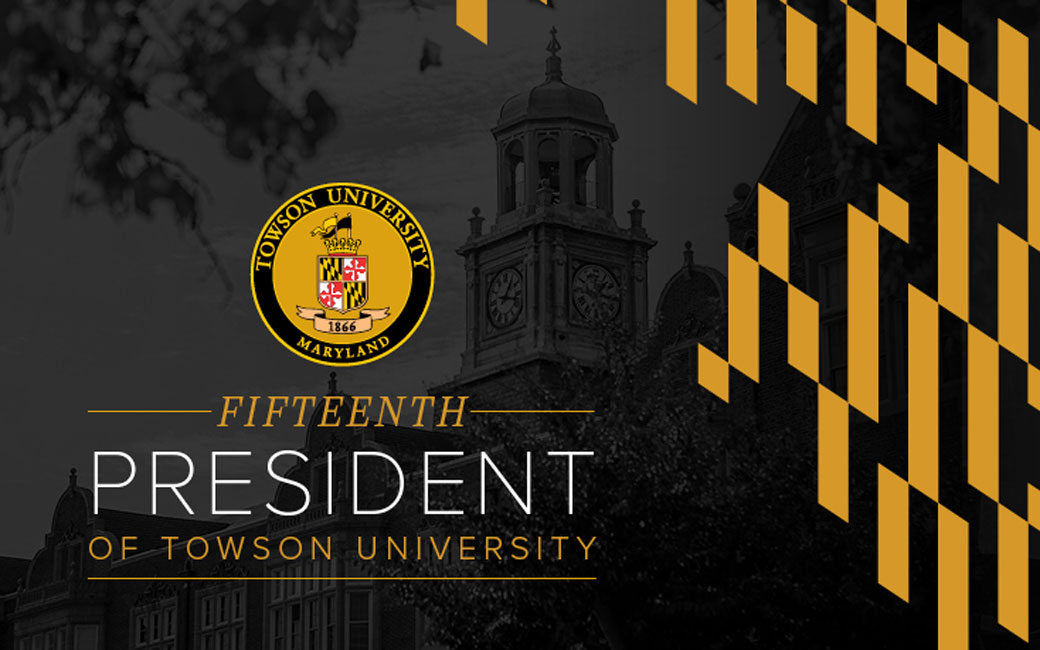Message from USM Chancellor Jay Perman Announcing TU's 15th President
Chancellor Perman sent the following message to the campus community on August 2.
By Towson University on August 2, 2023

To the TU Community:
I’m delighted to share that the USM Board of Regents has named Mark Ginsberg the next president of Towson University. He begins his presidency on Oct. 30.
Dr. Ginsberg is provost and executive vice president at George Mason University, Virginia’s largest comprehensive public research university, enrolling 40,000 students. He says the success of those students—and, indeed, the success of the entire university community—is his primary mission.
As provost, he’s built a student support architecture yielding a first-year retention rate of 87 percent and a six-year graduation rate of nearly 70 percent. His success model has involved expanding living-learning communities at Mason, strengthening academic advising and introducing success coaches, and redesigning the university’s orientation and first-year experience programs. He’s helped develop summer bridge programs for new students, and reimagined Mason’s core undergraduate program to produce a comprehensive, multidisciplinary academic experience.
Just as Towson serves a diverse community of students, Mason is a majority-minority university, and one in four learners is a first-generation college student. Among his initiatives to open access to as many learners as possible, Dr. Ginsberg has focused on fortifying community college pathways, making them more cost- and credit-efficient. Mason’s ADVANCE initiative features nearly 90 articulated academic programs and serves 3,000+ transfer students.
There’s much in Dr. Ginsberg’s résumé that honors TU’s founding as a teachers college and its enduring commitment to lifelong learning. He is, in fact, a teacher of teachers. Before becoming provost at Mason, he served for 10 years as the university’s dean of the College of Education and Human Development. For a decade prior to that, he was executive director and CEO of the National Association for the Education of Young Children. He knows that education doesn’t start—or stop—at the four-year university, and he’s demonstrably committed to building bridges with teachers, parents, and families across the “learning horizon.”
As Towson pursues Carnegie Classification as an R2 institution, Dr. Ginsberg’s experience at Mason—one of the nation’s youngest R1 universities—will be a huge asset. Mason’s rise to R1 status, signifying the highest level of research activity, is a credit to his investment in academic programs, research centers, administrative and operational supports, and personnel at all levels. He recruited a vice president for research, as well as five deans committed to Mason’s ascendancy as a comprehensive research university. He structured compensation packages for dozens of new faculty with promising research careers. And he nurtured a culture of inclusion, expanding diversity in Mason’s R&D enterprise, knowing, as he does, that inclusion is foundational to high research performance.
But this attention to research in no way blurs Dr. Ginsberg’s focus on teaching. At Mason, he crafted workload policies and practices, faculty evaluations, and promotion and tenure models that value teaching equally with research and scholarship.
Dr. Ginsberg knows well TU’s reputation for producing the state’s teachers and health care professionals—areas critically important to Maryland’s strength. His long experience as an educator is especially valuable as the state transforms P-12 public education with the visionary Blueprint for Maryland’s Future. He’s excited to build on TU’s respected programs and expand others with significant workforce and economic impact. He did exactly that at Mason, where he restructured and grew programs in computer science, cybersecurity, engineering, laboratory sciences, math, data analytics, and environmental/climate science.
Dr. Ginsberg is an eminent, oft-cited scholar in education, psychology, human development, and human services. He credits this expertise with a “relational” leadership style that values inclusiveness, respect, trust, collaboration, and cooperation. He aims to enrich TU’s organizational culture and cohesion by engaging the community in candid conversations on issues important to the university and to higher education writ large; by centering the vision of students, faculty, staff, alumni, and friends, and inviting them to imagine the future of TU together. In this way, he plans to lead not just from the front, but from behind, buoyed by students and colleagues equally invested in Towson’s success.
TU won’t be Dr. Ginsberg’s first experience in Maryland higher ed. For more than 20 years, he was on faculty at Johns Hopkins University, with appointments in the schools of education and medicine, and chaired the Department of Counseling and Human Services. In an early role at Hopkins, he served as director of the Faculty and Staff Assistance Program, and his commitment persists to cultivating environments where people are supported to be healthy and whole.
Maybe this is why Dr. Ginsberg has a habit of rising at every organization he joins. I’m excited to see how his collaborative leadership shapes Towson’s next chapter and accelerates achievement of the goals that all of TU holds close.
I’d be remiss not to acknowledge Interim President Melanie Perreault for her capable leadership of TU as this search was conducted. Dr. Perreault is a key reason for the university’s growing prominence in U.S. higher education. I’m grateful for her ambitious vision and steady hand, and I know she’ll be an invaluable asset to Dr. Ginsberg as he gets to know Towson University and its extraordinary people.
An announcement regarding Dr. Ginsberg’s appointment will be released shortly and will be available at the USM Newsroom. I know you join me in welcoming Mark Ginsberg to Towson University and to the USM family.
Sincerely,
Jay A. Perman
Chancellor